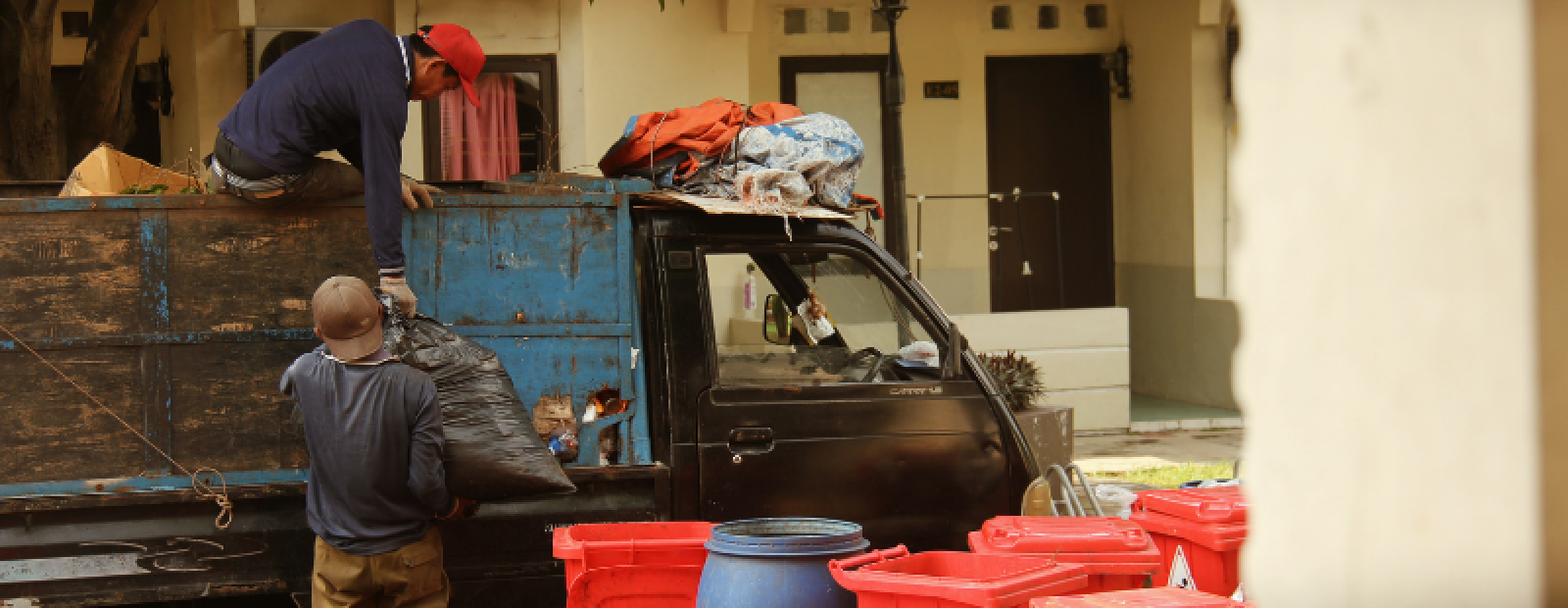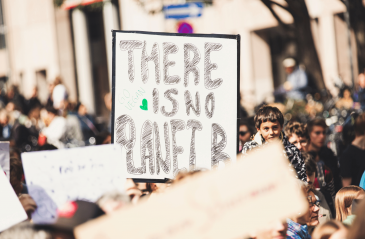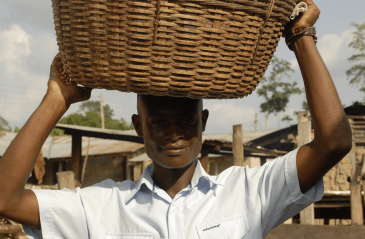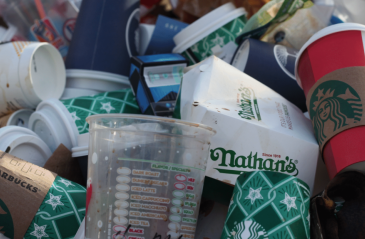
Waste Management Cooperative: Pune, India

The Solid Waste Collection and Handling (SWaCH) Cooperative Society was formed in 2008 as a public-private partnership to tackle the growing problem of solid waste management (SWM) in the city of Pune, in India. It is a workers’ Cooperative run by informal waste workers*, which receives infrastructure and policy support from the Pune Municipal Corporation.
Having begun as a workers’ movement focused on establishing informal waste workers’ right to safe and secure livelihoods, the SWaCH Cooperative has evolved organically to be a critical actor in Pune’s SWM system. It achieved this through awareness-raising exercises, demonstrations, and grassroots mobilisation around waste worker rights and SWM, and by instituting a democratic governance process involving all its 3,500+ waste workers. It has attained significant success in improving the SWM system in Pune, while also uplifting and protecting the livelihoods of its 3500+ informal waste worker members.
Due to the SWaCH Cooperative’s initiatives, today, 60 MT of waste is diverted away from landfills per day, with 80-85% of the waste generated in the city being recycled/processed, resulting in annual GHG emission savings of approximately 50,000 tonnes of CO2.
Background and Context
The city of Pune, the 8th largest city in India and one of the fastest growing urban agglomerations in the country, has struggled with managing its waste over the years. Waste levels grew from 300 tonnes per day in 19911 to 1700 tonnes per day in 2016.2 Prior to 2005, the municipal waste collection system in Pune involved residents making use of public containers to dispose of their daily waste, and informal waste workers scavenging from the containers to find recyclable items to sell. Waste segregation at source was virtually non-existent, and the collected waste was transported by the municipal workers to open dump sites & landfills. The lax waste management system led to high levels of pollution and public health concerns in the city, while also creating unsafe and unsanitary working conditions for formal and informal waste workers in the city.3, 4
Informal waste workers in Pune are among the most vulnerable and marginalised communities in the country. In the early 1990s,around 800 informal waste workers from across Pune assembled for a “Convention of Waste Workers” and formed their own Union - Kagad Kach Patra Kashtakari Panchayat (KKPKP), meaning ‘Paper Glass Tin Pickers’ Union.5,6 Over the years, KKPKP focused on increasing its membership, running targeted campaigns to bring public attention to waste management, while also advocating for integrating informal waste workers into the municipal system.7 In 2008, KKPKP’s efforts received wide recognition and the Pune Municipal Corporation (PMC), the civic body that governs Pune, signed an agreement with KKPKP, paving the way for the Solid Waste Collection and Handling (SWaCH)Cooperative Society to be established.8,9
The Initiative
The Solid Waste Collection and Handling (SWaCH) Cooperative is a pro-poor partnership aimed at establishing itself as a self-sustaining social enterprise of waste workers, focussed on sustainable solid waste management (SWM) and waste worker rights.10 It began as a pilot in 2005, led by the KKPKP. The operational costs of running the initiative (equipment, vehicles) are covered by the PMC, while waste workers are paid by customers (through a user-fee) and scrap recyclers (to whom they sell recyclable material). Initially only focused on uplifting the lives of waste workers, the SWaCH Cooperative has since diversified its actions to also provide SWM services such as composting, responsible disposal of e-waste, cleaning up the city’s water bodies through organised activities etc. By late 2007, the State Government mandated the implementation of Municipal Solid Waste Laws 2000, across all cities, which acted as a catalyst for the growth of the SWaCH Cooperative.11
How was the importance of SWM and waste workers’ rights presented and communicated?
Before SWaCH was set up
KKPKP’s early members commissioned several studies to quantify the economic savings amassed by the efforts of informal waste workers, for the PMC. These were published in local journals, as well as discussed on public platforms of well-established NGOs, creating a strong foundation from where KKPKP was able to present its case. The studies estimated:
Informal waste workers collect approximately 144 tonnes of recyclable scrap before it is transported, thus saving approximately INR 16M (approx. USD 220,000) per annum in transportation costs alone.
Increased transactions between informal waste collectors and their local retail scrap store amounted to an estimated daily income contribution of INR 375,000 (approx. USD 5,100), generating an estimated annual income of INR 185M (approx. USD 2.5M)12
KKPKP employed a host of measures, including organising and mobilising waste workers through public rallies and demonstrations, to convince the PMC to provide administrative and policy support for its user fee-based door-to-door waste collection pilot. The PMC, after in-person consultation sessions with key stakeholders (municipal officials and elected representatives), accepted the proposal. The pilot was able to demonstrate the larger impacts of formalising this working arrangement with informal waste workers. During the pilot, 1,500 waste workers transitioned from rummaging through landfills to providing door-step services to 150,000 households a day.13 The success of the pilot cleared the way for the formal setting up of the SWaCH Cooperative and the subsequent signing of a formal partnership agreement with the PMC.14,15
After SWaCH was set up
The SWaCH Cooperative communicated the needs of Pune’s waste workers to the PMC, while also engaging with the public to create wider awareness about safe & environment-friendly waste management practices.
The SWaCH Cooperative runs regular campaigns and webinars to promote its environment-friendly SWM approach, and establish the legitimacy of its waste worker members, and the crucial role they play in keeping the city clean. Their website acts as the key node for facilitating such campaigns with a consolidated repository of resources – pamphlets, fliers, and posters, both in English and the local language. The website hosts a dedicated section on short films and documentaries highlighting the cause the SWaCH Cooperative is fighting for as well as the challenges it faces. Videos on meetings and consultations on waste and recycling, involving both the SWaCH Cooperative members and the public are also published on the website. The SWaCH Cooperative regularly leverages social media platforms to promote its activities to the wider public.16,17 Their outreach team, comprising 160+ coordinators, also liaises directly with stakeholders through door-to-door campaigns.18
The waste workers themselves are the most critical actors in driving public engagement around waste management. On their daily rounds they speak to people about their work, advise them on best practices on waste management, and also seek on-the-spot feedback.19 They also regularly do media events and participate on international platforms to discuss their work and cause.20,21The SWaCH Coopertive’s initiatives are still ongoing today and are regularly adapted to the most pressing environmental issues at the time.
What was the extent and nature of citizen collaboration?
Since its inception, the SWaCH Cooperative followed a coordinated outreach strategy to engage, involve, and act in synergy with the City’s policy aspirations. Through demonstrations, petitions, meetings, and research advocacy, they engaged with the PMC to keep pushing for institutionalisation of their members into the formal municipal waste management system. Through community outreach and media campaigns, documentaries, and awareness campaigns, the SWaCH Cooperative involved the city residents in the cause, gaining wider acceptance and support.
Collaboration among waste workers
The SWaCH Cooperative, when initially set up, was small and depended on its payroll staff to work on specific geographic areas in the city to engage with other waste workers. The staff were responsible for reaching out to the waste worker community, building awareness on the need for formalising their work status and being able to access health and welfare protections, and driving up membership. The SWaCH Cooperative follows a democratic governance process led by a Board consisting of founder members, and Pratinidhis (representative leaders from the waste worker group). Pratinidhis are elected on the basis of an in-person show-of-hands voting system from among the 3,500+ waste workers associated with the SWaCH Cooperative. The board facilitates and builds the capacity of the Pratinidhis for self-governance. Decision-making is based on a consultative process and grassroots waste workers can influence decision-making and prioritisation through their representative leaders.
As its membership grew, the SWaCH Cooperative began onboarding its members via thematic orientation programs at Union offices, regular workshops, training on grievance redressal processes etc. The thematic sessions focused on areas such as health or education and were participatory in nature, providing the waste workers with an opportunity to share their knowledge and experiences.22 With time, the SWaCH Cooperative also brought the family members of the waste workers within its ambit by providing them with work opportunities within local teams. The prospect of working in a formal office set-up and transitioning away from manual waste picking and its associated health risks was seen positively by waste workers’ families, leading to successful uptake and deeper engagement.
Collaboration between waste workers and the public
The SWaCH Cooperative runs periodic campaigns that bring waste workers, NGOs, and city residents together on a common platform to raise awareness and enable interaction and discussions on waste management issues and policy.
One key initiative was the Red dot campaign, which was initiated to build awareness around safe and hygienic sanitary waste disposal practices. The need for such an initiative was first pointed out by waste workers in one of their regular consultation sessions with the Board. Daily, the SWaCH workers collect ~20,000 Kg of dirty diapers and sanitary pads. Exposed sanitary waste is harmful for the health of waste workers who need to segregate it from other scrap.
Door-to-door campaigns for 30,000 city residents were organised, raising awareness on how sanitary waste could be wrapped and marked with a red dot. To facilitate easy uptake, the SWaCH workers themselves also made paper bags labelled with red dots, which they sold for a nominal amount during their rounds.23,24 Waste collection vehicles were also fitted with red-dot marked compartments, that acted as a daily reminder of the campaign.25 Posters were put up in public places and t-shirts, mugs and gift items carrying similar messaging were also made widely available.26 The SWaCH Cooperative also runs various workshop sessions on menstrual health & sanitary disposal.
The SWaCH Cooperative also initiated the “Send it back” campaign in 2013, where sanitary pads were sent back to the companies that manufactured these products (including Kimberly-Clark, Procter & Gamble) to nudge them to think more responsibly about disposal and packaging waste when developing their product strategy. The awareness raised through this move has led to SWaCH workers now actively engaging with Procter & Gamble to find ways for product packaging to be repurposed as degradable red-dot disposal bags.
Another initiative is the Recycling Trail - a shadowing field exercise organized by the SWaCH Cooperative, where volunteers follow SWaCH’s waste workers on their door-to-door rounds and get first-hand experience on the waste management value chain in Pune. It is a voluntary activity wherein interested individuals/organisations/institutions can formally sign up through the SWaCH website.27,28
What was the level of action addressed by the public engagement?
The community engagement process targeted action at the individual, community and systems-level. The objective of the initiatives and associated public engagement, carried out by SWaCH was to protect the rights of informal waste workers in the city, and work in close partnership with the PMC to manage SWM in Pune. Their secondary objective was to raise wide-spread awareness on the issues of SWM and waste worker rights with the public, and other communities of informal waste workers across the country.
The Public Impact
Through SWaCH initiatives, 60 MT of waste is diverted away from landfills every day, with 80-85% of the waste generated in the city being recycled/processed, resulting in annual GHG emission savings of approximately 50,000 tonnes of CO2.29
The SWaCH Cooperative’s door-to-door collection model has helped PMC save ~ INR 900M rupees (USD 12.5M) per year in labor, processing and transportation costs, which is 46 percent of the capital budget for Pune’s SWM system.30
KKPKP and the SWaCH Cooperative’s efforts also helped with socio-economic upliftment of its 3500+ waste worker members, from formalising their work contracts and getting them access to health and welfare protections to supporting their families and children access loans, scholarships, vocational skills training etc.
As the SWaCH Cooperative’s contract with the PMC is due for renewal in 2021, the waste workers have gathered signatures from 600,000+ households in Pune to be submitted to the PMC, a testament to the levels of support they have built among the residents and the important role they play in city’s waste management value chain31
The SWaCH Cooperative has influenced policy decisions on SWM beyond Pune, and elements of the SWaCH model are being implemented across other Indian cities.32
Further Considerations and Lessons from this Case
From CPI’s extensive work on public engagement, we have found three important drivers to public impact that are relevant to discuss when designing public engagement processes around climate change: Enabling Adaptability and Learning; Designing for Inclusion; and Embracing Complexity. We discuss the relevance of each to the case study below:
Enabling Adaptability and Learning
The SWaCH Cooperative is a worker-led initiative where the 3,500+ waste workers are empowered to make decisions on the focus areas of the sustainable waste management campaigns, and where and how they will be run. As was outlined with the Red dot campaign on sanitary waste, the issue was first raised by one of the waste workers in a consultation meeting with the SWaCH board. Post the meeting, various initiatives and sub-campaigns addressing the issue were run by the SWaCH members. This included large-scale awareness campaigns, media engagement and workshop sessions. Since the SWaCH members conduct door-to-door waste collection services daily, they are also well-placed to experiment with and test campaign-related messaging, and relay lessons back to the wider group. In this way, the democratic decision-making structure, and the bottom-up delivery model provides waste workers the autonomy to tailor their strategy in a flexible and adaptive manner, that allows them to experiment and learn along the way.
This flexibility also enables them to more effectively deal with exigencies and uncertainties. During the COVID-19 lockdown, the SWaCH Cooperative modified its outreach and services to suit the restrictions. For example, several additional information leaflets in both English and Marathi were posted on the website to raise awareness on how to sort and collect waste during the lockdown. The SWaCH Cooperative also promoted several short videos through its website and social media platforms to engage the public’s support. For example, some videos featured SWaCH workers holding placards such as - WE stayed at work for you. YOU stay at home for us and help.33
Designing for Inclusion
The SWaCH Cooperative was designed for inclusion and justice from the outset. The driving force for the initiative was KKPKP’s efforts to bring its marginalised waste worker members within the formalised ambit of the municipal waste management system, which it achieved while also driving the uptake of SWM across the city. KKPKP made it their goal to provide formal recognition to its waste worker members by providing them with ID cards, lobbying with the PMC to consider waste worker rights, while also providing basic economic services such as insurance, micro credit to them. At the same time, the waste workers operated autonomously, making independent and collective decisions on their work hours and on campaigns, a freedom that they had been unable to enjoy in their earlier mode of operation. Further, efforts were made to involve and support the families of the waste workers in gaining access to education, vocational training in order to help them earn a stable source of income.
While the overall initiative has driven forward the tenets of inclusion and justice, the internal governance model with representative leaders speaking for the waste workers, unless facilitated consciously, could breed majoritarianism with a tendency to favour more vocal spokespersons and/or feed interpersonal politics over broader inclusion goals within the waste worker community.
Embracing Complexity
Keeping the city clean and pollution-free in a cost-effective manner by managing the burgeoning waste and keeping the waste disposal process environmentally friendly was a challenging prospect in itself, before adding in the complexities of providing worker protection and rights to marginalised informal waste workers. In addition to this, the areas of waste management, public health, pollution, worker rights etc. are each handled by different government departments, further limiting the success of interventions. However, the SWaCH Cooperative managed to bring together these various objectives, and align their work model to address the broader value chain of SWM in Pune, and highlight the interlinkages and interdependencies between them. This enabled the SWaCH Cooperative to drive a successful advocacy campaign and subsequently partner with the PMC.
The SWaCH Cooperative also seems to have made efforts to drive forth a similar narrative with city residents. According to SWaCH workers, many residents of Pune were already quite aware about SWM, however making them understand the urgency of this issue was a major challenge.34 Following a coordinated strategy that involved citizen-led volunteerism and proactive outreach campaigns, the SWaCH Cooperative works continually to present a big picture view of SWM and the roles that the waste workers can play and the role that citizens and businesses can also play in the system.
Bibliography
[1] Garbage crisis may render Pune’s ‘Smart City’ ambitions a dream, Shoumojit Banerjee, January 2016, The Hindu news report, https://www.thehindu.com/news/national/other-states/Garbage-crisis-may-render-Pune%E2%80%99s-%E2%80%98Smart-City%E2%80%99-ambitions-a-dream/article14017554.ece, Accessed 23 February 2021
[2] Pune Municipal Corporation - Waste Management Statistics, https://www.pmc.gov.in/en/waste-management-overview, Accessed 23 February 2021
[3][5][29][30] Closing the loop - Innovative partnerships with informal workers to recover plastic waste, in an inclusive circular economy approach, Harri Moora and Harshad Barde, March 2019, United Nations Economic and Social Commission for Asia and the Pacific, https://www.unescap.org/resources/closing-loop-pune-india-case-study, Accessed 15 February 2021
[4] Involving waste-pickers to improve door-to-door collection, SWaCH Resources, SWaCH Cooperative Pune, https://swachcoop.com/pdf/wastepickerstoimprovedoor-to-doorcollection.pdf, Accessed 15 February 2021
[6][12][22] Organising the Unorganised: A Case Study of the Kagad Kach Patra Kashtakari Panchayat (Trade Union of Waste-pickers), Poornima Chikarmane and Laxmi Narayan, January 2005, Women in Informal Employment: Globalizing and Organizing (WIEGO), https://www.wiego.org/resources/organising-unorganised-case-study-kagad-kach-patra-kashtakari-panchayat-trade-union-waste-#:~:text=of%20Waste%2Dpickers)-,Organising%20the%20Unorganised%3A%20A%20Case%20Study%20of%20the%20Kagad%20Kach,Trade%20Union%20of%20Waste%2Dpickers)&text=WIEGO.,Abstract%3A&text=The%20union%20is%20also%20aiming,into%20official%20garbage%20collection%20schemes., Accessed 15 February 2021
[7][8][15] The Story of Waste and its Reclaimers: Organising Waste Collectors for Better Lives and Livelihoods, Anjor Bhaskar and Poornima Chikarmane, 2012, The Indian Journal of Labour Economics, Vol. 55, No. 4, https://swachcoop.com/pdf/AnjorBhaskar.pdf, Accessed 15 February 2021
[10] SWaCh Cooperative Pune - Impact – Website, https://swachcoop.com/about/impact/, Accessed 15 February 2021
[11] SWaCh Cooperative Pune - History – Website, https://swachcoop.com/about/history/, Accessed 15 February 2021
[13][32] Prizeforcities.org, https://prizeforcities.org/project/swach-pune-seva-sahakari-sanstha, Accessed 15 February 2021
[14] Integrating Waste Pickers into Municipal Solid Waste Management in Pune, India, Poornima Chikarmane, July 2012, WIEGO Policy Brief (Urban Policies) No 8, https://swachcoop.com/pdf/Chikarmane_WIEGO_PB8.pdf, Accessed 15 February 2021
[16] SWaCH Facebook page, https://www.facebook.com/pg/SWaCH-1410333882519953/videos/?ref=page_internal, Accessed 15 February 2021
[17] SWaCh Cooperative Pune - Resources – Website, https://swachcoop.com/about/resources/, Accessed 15 February 2021
[18][19] SWaCH YouTube resources, https://www.youtube.com/watch?v=bMvU5bOHpTU, Accessed 15 February 202SWaCh Cooperative Pune - Organogram, https://swachcoop.com/about/organogram/, Accessed 15 February 2021
[20] Global Alliance of Waste Pickers at COP17, December 5, 2011, gearsofchange, https://www.youtube.com/watch?v=SgCTgC8Q50E&ab_channel=gearsofchange, Accessed 15 February 2021
[21] COP17 Durban: While indecision reigned…, December 8, 2011, Anil Agarwal, https://www.youtube.com/watch?v=y6BpvMi3Mog&ab_channel=AnilAgarwal, Accessed 15 February 2021
[23] A Simple Red Dot On Your Menstrual Waste Can Change A Sanitation Worker’s Life, Gopi Karelia, February 2018, NDTV India, https://swachhindia.ndtv.com/simple-red-dot-menstrual-waste-can-change-sanitation-workers-life-2-5840/, Accessed 15 February 2021
[24] SWaCH Cooperative Pune - VIDEO: Red Dot Campaign, https://swachcoop.com/video-red-dot-campaign-1/, Accessed 15 February 2021
[25] PMC starts red dot campaign in three wards, Manjula Nair, July 2019, Times of India, https://timesofindia.indiatimes.com/city/pune/pmc-starts-red-dot-campaign-in-three-wards/articleshow/70219513.cms, Accessed 15 February 2021
[26] Red-Dot campaign launched across Pune, Staff report, February 2017, Indian Express, https://indianexpress.com/article/cities/pune/red-dot-campaign-launched-across-pune-4513296/, Accessed 15 February 2021
[27] SWaCH Cooperative Pune - VIDEO: Red Dot Campaign, https://swachcoop.com/initiatives/recycling-trail/, Accessed 15 February 2021
[28] Business Education students go on a waste recycling trail to examine opportunities in the fast emerging waste management sector, Staff report, February 2020, Punekar News, https://www.punekarnews.in/pune-business-education-students-go-on-a-waste-recycling-trail-to-examine-opportunities-in-the-fast-emerging-waste-management-sector/, Accessed 15 February 2021
[31][34] Interview with Suschismita Pai, SWaCH Outreach Manager, 19 February 2021
[33] SWaCh Cooperative Pune, https://swachcoop.com/, Accessed 15 February 2021

Engaging the Public on Climate Change
Our Case Study Compendium provides practitioners with a framework to unpack different approaches, outlining how public engagement can better embrace the complexity of climate issues.
You may also be interested in...


Community Managed Marine Conservation: Kuruwitu, Kenya

Green Participatory Budgeting: Lisbon, Portugal

Oxford Citizens’ Assembly on Climate Change, Oxford, UK

Forest Investment Program: High Forest Zone, Ghana

Food: Too good to waste (FTGTW) network, U.S.
